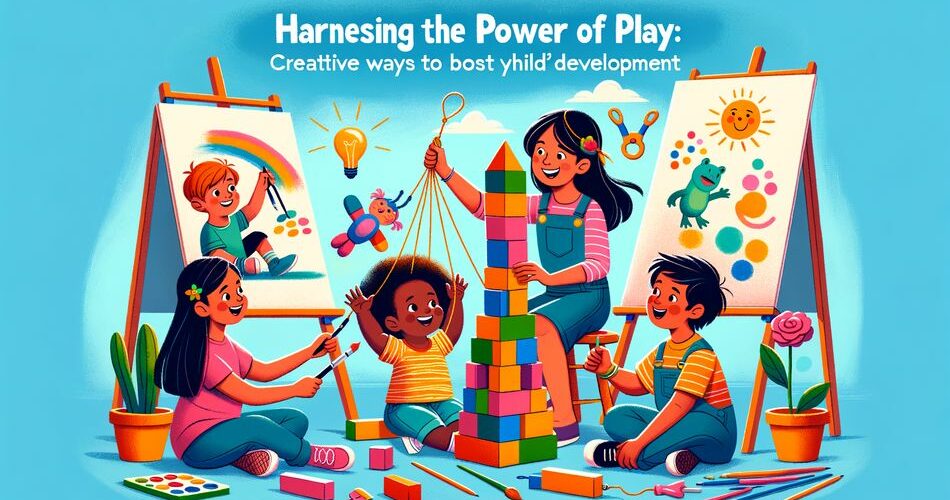At Growing Together, we are committed to providing expert parenting tips and child development advice to support you on your parenting journey from newborns to teens. One critical area we focus on is harnessing the power of play to boost your child’s development. Play isn’t just a way for children to have fun; it’s also a powerful tool that can significantly impact their social, emotional, cognitive, and physical development. Let’s dive into creative ways to leverage play effectively.
Introduction
Play is often regarded as the joyful free time in a child’s life, but it is much more than that. Play is fundamental to a child’s growth, providing a rich learning experience that can shape their future. Through play, children explore their environment, develop new skills, and understand the world around them. By integrating various types of play into their daily routines, parents can foster an environment that promotes holistic development. Here’s how you can harness the power of play to boost your child’s development in creative and effective ways.
Body
1. Encourage Imaginative Play
Imaginative play, also known as pretend play or role-playing, is a crucial aspect of a child’s development. It helps children develop their creativity, problem-solving skills, and emotional understanding. Here are some ways to encourage imaginative play:
- Create a Dramatic Play Area: Set up a space with costumes, props, and everyday items where children can role-play different scenarios such as a doctor’s office, kitchen, or grocery store. This kind of play helps children understand various roles and responsibilities.
- Storytelling: Encourage children to create their own stories or act out their favorite fairy tales. This activity enhances their narrative skills and fosters a love for literature.
- DIY Projects: Provide craft materials and let your child create their own toys or play scenes. Simple items like cardboard boxes can transform into spaceships or castles, stimulating their imagination.
2. Foster Physical Play
Physical play is essential for developing motor skills, coordination, and overall physical health. Ensuring that your child has ample opportunities for physical activities can lead to a healthier and more active lifestyle. Here are some ideas:
- Outdoor Adventures: Take your child to parks, playgrounds, or hiking trails frequently. Outdoor play not only provides physical exercise but also allows them to explore nature and develop a sense of adventure.
- Sports and Games: Introduce your child to various sports such as soccer, basketball, or swimming. Playing team sports can foster teamwork, discipline, and social skills.
- Interactive Play Equipment: Investing in equipment like trampolines, climbing walls, or balance bikes can help enhance their physical abilities while keeping playtime fun.
3. Promote Cognitive Play
Cognitive play involves activities that challenge and stimulate your child’s thinking abilities. This type of play is excellent for developing problem-solving skills, logical reasoning, and memory. Here’s how you can promote cognitive play:
- Puzzles and Board Games: Provide age-appropriate puzzles and board games that require strategy and critical thinking. Games like chess, checkers, or memory matching can be both educational and fun.
- Sensory Bins: Create sensory bins with different textured materials such as rice, beans, or water beads. These bins can include hidden objects that children must find, encouraging sensory exploration and fine motor skills.
- STEM Toys: Invest in toys that promote Science, Technology, Engineering, and Math (STEM) learning. Building blocks, robotics kits, and science experiment sets can spur curiosity and analytical thinking.
4. Encourage Social Play
Social play is crucial for helping children develop their interpersonal skills, empathy, and understanding of social norms. Interacting with peers through play teaches kids about communication, cooperation, and conflict resolution. Here’s how to nurture social play:
- Playdates and Group Activities: Arrange playdates with other children or participate in group activities like dance classes, art workshops, or sports teams. Such interactions promote social bonding and collaborative play.
- Family Game Nights: Set aside regular times for the family to play games together. This not only strengthens family bonds but also allows children to learn social cues and etiquette in a supportive environment.
- Role-Playing Games: Engage in role-playing games where family members take on different roles. This can help children understand different perspectives and practice empathy.
Conclusion
Harnessing the power of play is a rewarding and effective way to support your child’s holistic development. By incorporating imaginative, physical, cognitive, and social play into their daily routines, you provide a rich and diverse environment for growth. Encouraging various forms of play not only boosts your child’s development but also strengthens your connection with them. Remember, the key is to make playtime enjoyable and meaningful, fostering a lifelong love for learning and exploration.
At Growing Together, we believe in the profound impact that play can have on a child’s life. By leveraging the tips and strategies shared in this post, you can create an enriching environment that supports your child’s overall well-being and development. Happy playing!

